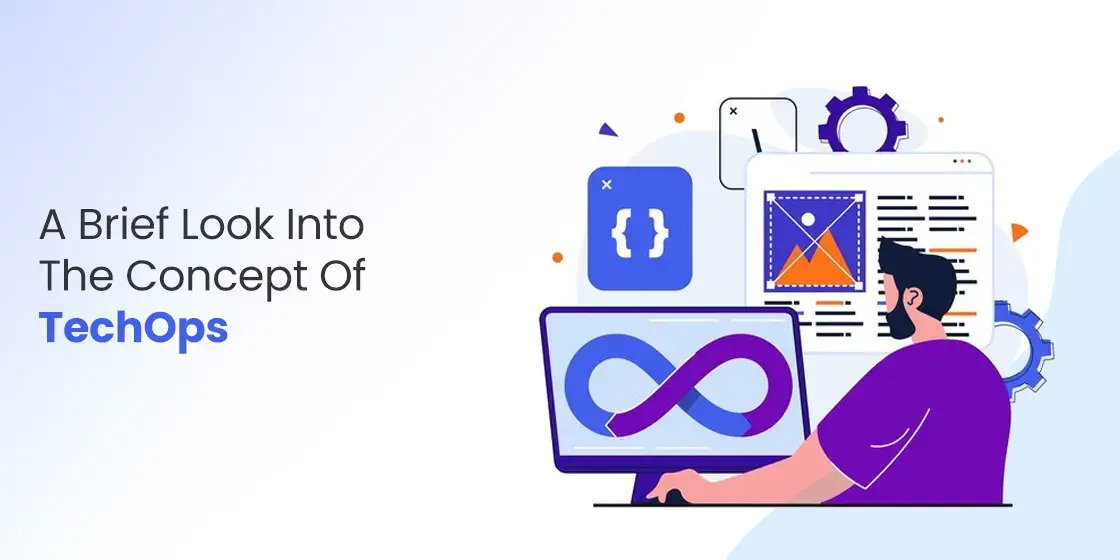Table of Content
Know What is TechOps Process and How it Streamlines the Management of Different Operational Tasks
In the dynamic realm of technology, where innovation is the heartbeat of progress, the term “TechOps” resonates as a pivotal force shaping the landscape of modern enterprises. As the digital era unfolds, organizations are compelled to embrace a holistic approach to manage their technological infrastructure seamlessly. At the heart of this revolution lies the intricate discipline of TechOps, an amalgamation of technology and operations that goes beyond conventional IT practices. In this blog, we will explore what is TechOps and understand its significance, evolution, and the transformative role it plays in fostering a resilient and efficient technological ecosystem.
TechOps, short for Technology Operations, represents a paradigm shift from traditional IT management approaches. It transcends the silos that often exist between development and operations teams, fostering collaboration and synergy. This fusion is not merely a harmonious blend of software and hardware; rather, it is a strategic alignment that strives to enhance the overall performance, scalability, and reliability of an organization’s technological infrastructure. By delving into the intricate mechanisms of TechOps, we aim to demystify its core principles and shed light on how it empowers IT companies to offer top-notch software development services to different types of clients.
The evolution of TechOps mirrors the relentless pace of technological advancements. From its roots in the DevOps movement, TechOps has grown into a multifaceted discipline that encompasses a spectrum of practices, tools, and methodologies. In this blog, we’ll trace the historical trajectory of TechOps, examining its emergence as a response to the challenges posed by the ever-expanding digital footprint. Through this retrospective lens, we gain insights into the driving forces that led to the evolution of TechOps, shaping it into a vital component of modern IT strategies.
But, before moving straight into that, we will first take a look at the origins of this process, as how it emerged and what made it different from the other IT processes.
What is TechOps?

TechOps, an abbreviation for Technology Operations, stands as a comprehensive approach to managing and optimizing an organization’s technology infrastructure. At its core, TechOps is a strategic alignment of technology and operations, aiming to break down the traditional silos that often exist between development and operations teams. Unlike conventional product management process, TechOps is not limited to overseeing the technical aspects of a business but extends its reach to foster collaboration, enhance performance, and ensure the seamless functioning of an organization’s technological ecosystem.
One of the key pillars of TechOps lies in its commitment to collaboration. It seeks to bridge the gap between development and operations teams, fostering a unified approach to technology management. By aligning these traditionally distinct domains, TechOps promotes a culture where communication flows seamlessly, and both teams work in tandem to achieve common goals. This collaborative spirit extends beyond human interactions to include the integration of tools and methodologies that streamline processes, reduce bottlenecks, and enhance overall operational efficiency.
Fuel innovation by leveraging bespoke software solutions. Get in touch with our team of experts to build cutting-edge software products.
Get a QuoteThe evolution of TechOps is deeply intertwined with the rapid pace of technological advancements. Originally rooted in the DevOps movement, TechOps has evolved into a dynamic discipline that adapts to the evolving needs of businesses in the digital age. It incorporates a diverse range of practices, tools, and methodologies aimed at ensuring that an organization’s technological infrastructure is not just a support function but a strategic enabler of business objectives. TechOps, therefore, represents a proactive response to the challenges posed by the digital revolution, positioning itself as an indispensable component of modern IT strategies.
Differences Between TechOps and DevOps

TechOps (Technology Operations) and DevOps (Development Operations) are two related but distinct approaches to managing IT infrastructure and software development processes within an organization. A lot of people think that these processes are similar to each other. They might think like this due to seeing some canny resemblance in their names, but it is certainly not the real case.
TechOps primarily focuses on the operational aspects of technology, ensuring the stability, reliability, and performance of IT systems. It involves tasks such as server provisioning, network management, system monitoring, and overall infrastructure maintenance. TechOps teams are traditionally responsible for managing the day-to-day operations of IT environments, addressing issues, and ensuring that the technology infrastructure meets the organization’s requirements. The goal of TechOps is to keep the technology stack running smoothly and efficiently.
On the other hand, DevOps is a broader and more collaborative approach that seeks to bridge the gap between development and operations teams. DevOps aims to enhance communication, collaboration, and integration between these traditionally siloed teams to streamline the software development lifecycle. DevOps involves the automation of processes, continuous integration and delivery (CI/CD), and the adoption of a culture that emphasizes collaboration and shared responsibility.
In short words, while TechOps concentrates on the operational aspects of technology infrastructure, ensuring stability and performance, DevOps is a holistic approach that brings together development and operations teams to achieve greater efficiency, collaboration, and automation throughout the entire software development lifecycle. TechOps can be seen as a subset of DevOps, with a more specific focus on operational tasks within the broader context of the DevOps philosophy.
How TechOps Became Popular in the IT Circuit

The emergence of TechOps in the tech world can be traced back to the growing complexity of IT environments and the need for specialized teams to manage and maintain the operational aspects of technology infrastructure. As organizations expanded their use of technology, managing servers, networks, and systems became increasingly challenging. The rise of large-scale, distributed applications and the shift towards cloud computing further emphasized the importance of efficient technology operations.
TechOps evolved as a response to these challenges, with a primary focus on ensuring the stability, reliability, and performance of IT systems. The need for specialized expertise in areas such as server provisioning, configuration management, and infrastructure monitoring led to the formation of dedicated TechOps teams. These teams played a crucial role in addressing operational issues, optimizing system performance, and supporting the day-to-day functioning of complex IT environments.
The emergence of TechOps also reflects a recognition of the distinct skill sets required for effective technology operations. As organizations sought to maximize the availability and performance of their technology infrastructure, TechOps teams became essential in maintaining a robust operational foundation. That is how everyone felt the need of TechOps which eventually made this process a pretty regular one for the IT companies.
Key Responsibilities of a TechOps Team

A TechOps team is responsible to carry out different types operational tasks. They are usually related to the technical management and handling of the products, as this operation lies mainly in the bucket of a TechOps team.
For beginners, who do not know what type of tasks this team usually performs, take a look at the list of different technical operations defined below.
Infrastructure Management
TechOps specialists play a pivotal role in overseeing and maintaining the organization’s technology infrastructure, encompassing a comprehensive array of hardware, software, and networking components. This multifaceted responsibility involves a spectrum of tasks, from the meticulous selection and installation of servers and storage systems to the configuration and upkeep of databases and other critical infrastructure components.
Furthermore, TechOps specialists engage in collaborative efforts with both external vendors and internal team members. Their interactions with vendors involve evaluating and selecting technologies that align with the organization’s business needs and objectives. This includes negotiating contracts, assessing the viability of different solutions, and maintaining vendor relationships.
Disaster Recovery
Specialists in Technology Operations are responsible for the strategic development and meticulous maintenance of disaster recovery plans to guarantee swift system restoration in the face of outages or catastrophic events. This multifaceted responsibility encompasses the comprehensive implementation of backup and recovery processes specifically tailored for critical systems.
In their collaborative efforts, TechOps specialists closely engage with various teams to ensure the seamless alignment of disaster recovery plans with the overarching business needs and goals of the organization. This involves continuous communication and coordination to understand the evolving technological and functional requirements.
Software Security
TechOps engineers play a crucial role in safeguarding the organization’s systems and data through a comprehensive array of measures. This includes the meticulous implementation of security protocols, encompassing robust firewalls, intrusion detection systems, and access controls. By strategically deploying these security measures, TechOps professionals aim to prevent unauthorized access and fortify the organization’s defenses against potential threats.
Staying at the forefront of the dynamic landscape of cybersecurity, TechOps professionals go beyond the implementation of static security measures. They actively engage in continuous learning and stay abreast of the latest security threats and vulnerabilities. This proactive approach enables them to anticipate and understand emerging risks, allowing for the timely adjustment and enhancement of security protocols.
Automation
TechOps teams are dedicated to enhancing operational efficiency and minimizing the potential for errors by strategically implementing automation across various processes and tasks. This comprehensive approach involves the automation of critical functions such as software deployments, system backups, updates, routine system health checks, and performance monitoring.
The automation initiatives undertaken by TechOps teams extend beyond routine operations, aiming to create a dynamic and self-sustaining infrastructure. By automating software deployments, for instance, they ensure consistent and error-free rollouts, promoting system reliability. Moreover, the automated execution of backups and system updates ensures data integrity and security while minimizing the operational burden on TechOps professionals.
Infrastructure Monitoring
Another important job of the TechOps team is to continuously monitor the performance of the system. They are responsible to check and verify whether all the things in the system infrastructure are working correctly or not. To do that, they need to plan their shifts accordingly, so that continuous analysis of the system efficiency can be done properly. It definitely requires skilled professionals at the work, because it generally involves in-depth analysis of different running processes.
From collecting data to checking daily updates, there are various tasks involved in this process that needs continuous monitoring. If any one of them gets neglected, then the toll can come out on the whole system. It can not only disrupt the performance, but could also lead to complete failure of the system sometimes. That is why TechOps team need to monitor the system continuously in order to avoid any unwanted event.
Important TechOps Engineering Tools
If you are looking to become a TechOps engineer, you need to know about the tools and technologies that are commonly used in this team. Many people think that conventional software development tools are used in TechOps processes, which is certainly not the case.
Below, we have defined some process categories and the tools that are used in them. Take a look at these names and plan how to learn them to move forward in TechOps engineering.
Monitoring Tools
These tools are precisely used to monitor the status of different processes. It lets the administrator know whether the system is working correctly as per the defined benchmarks or not. It includes many notable names like Nagios, Zabbix, SolarWinds Network Performance Monitor and more others.
Cloud Platforms.
Cloud platforms are increasingly becoming popular among the companies for hosting apps and websites. They offer a robust platform secured with different advanced protocols to host commercial apps with ease. Some of the top cloud platforms that offer plethora of features for hosting includes Amazon Web Services (AWS), Microsoft Azure, Google Cloud Platform and more others.
Automation Tools
TechOps teams also use some specific tools for automation. They are used to streamline different complex processes that often take too much time to complete. With the help of these tools, TechOps admins can manage them efficiently without requiring any manual effort. Some of the top tools among them includes Ansible, Puppet, Chef and more others.
Security Tools
Many security tools are also used by the TechOps teams to safeguard the confidentiality of the app data and information. This certainly requires a lot of technical knowledge, as it is one of the hardest job known in the tech industry. Some of the notable security tools that are used regularly by TechOps teams include Wireshark, Metasploit, Nessus and more others.
Final Words
That takes us to the end of this blog in which we have discussed what is TechOps and why it is quickly becoming popular in the IT industry. It is a unique approach towards handling different processes that are often difficult to manage manually. The TechOps team is specifically hired to take care of all these issues without making any disruption in the running processes. Those who do not know what is TechOps, should read this blog again to understand how it works and what type of tasks it manages in a routine cycle.
Meanwhile, if you are looking for a company that can help you to manage different DevOps and TechOps processes efficiently, give us call today. We will assist you to get a dedicated team that will handle all your operational tasks with ease.
Empower your digital initiatives with BariTechSol, a premier custom software development company. Our skilled team tailors cutting-edge solutions to your unique needs. Elevate your tech experience and stay ahead in the digital realm. Partner with BaritechSol and code the success of your next big idea.


